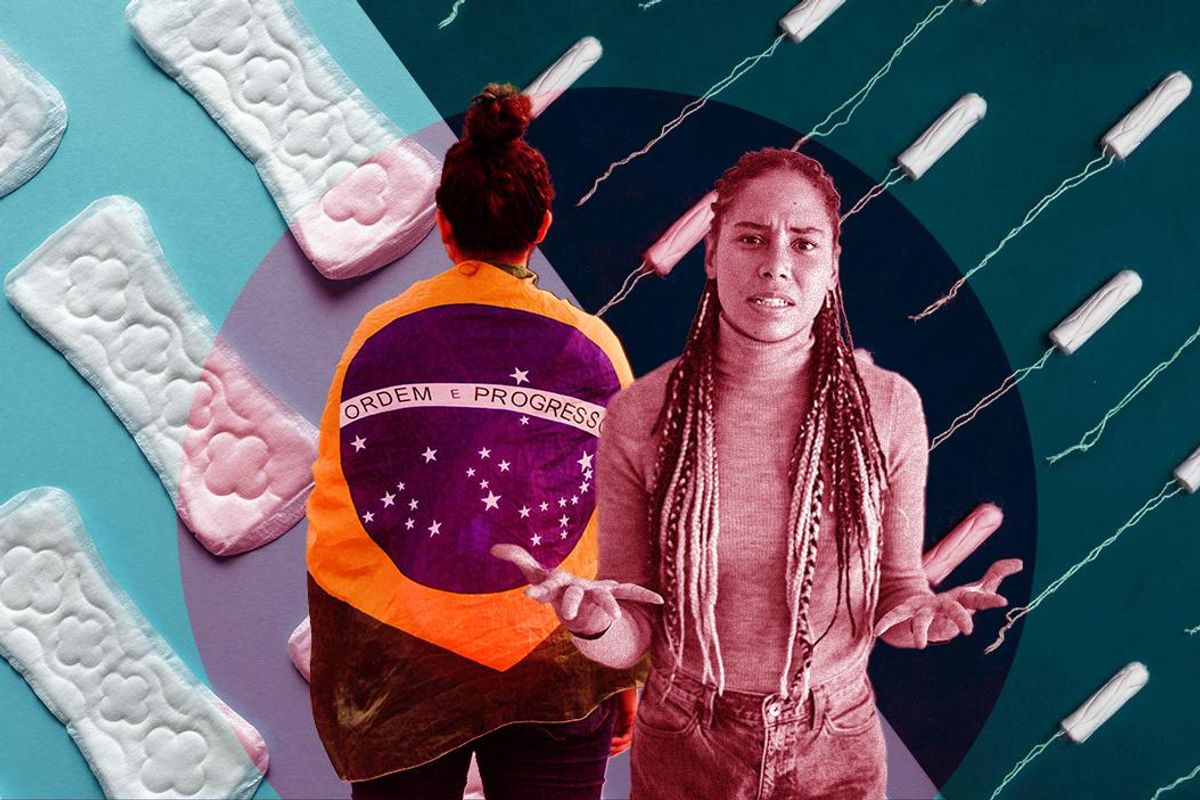Brazil's bold President Jair Bolsonaro did a bad thing this week. He blocked legislation that would have provided free sanitary pads and tampons to disadvantaged Brazilian women and girls. In a country where 25 percent of girls miss school because they don't have access to sanitary products or bathrooms when they're menstruating, this is a pretty big deal.
Laws aimed at addressing period poverty — lack of financial access to basic hygiene products like pads, tampons, and soap – are often framed by male-dominated governments as excessive and inessential. They are so wrong.
What's the problem? For most post-pubescent girls and women, periods arrive monthly, whether you like it or not. But that doesn't mean you have the means to deal with it. In many poverty-stricken countries across Latin America, Asia and Africa, access to pads, tampons and menstrual cups is scarce. For poor families, buying these products can mean going without staples like milk and bread. Many girls and women are forced to find unhygienic substitutes.
In India, for example, where the problem is rife, women have been known to use dirty rags, sand, newspaper, leaves — and even ash – to absorb period blood, often resulting in severe bacterial infections like toxic shock syndrome. Around 70 percent of all reproductive diseases in India are caused by poor menstrual hygiene.
Meanwhile, in Brazil, about 4 million girls don't have access to sanitary pads or soap or bathrooms — and around 5.6 million women and girls stood to benefit from the proposed law that Bolsonaro nixed. Countries like Venezuela — where a box of tampons can cost as much as three month's salary — as well as South Africa are grappling with similar issues.
In many places, cultural attitudes hold back progress on addressing menstrual poverty. This is the case in India and many Muslim-dominant countries where vaginal bleeding is considered dirty and taboo. As a result, menstruating women are often excluded from cultural and religious events. Anecdotal evidence suggests that Indian women's reluctance to wash and dry their reusable pads in the sun (a disinfectant) has become a public health problem.
But this isn't just an issue in the developing world. Period poverty is prevalent across the UK, EU, US, and Australia, too. That's in part because sanitary items have traditionally been dubbed "non-essential," and so are often subject to high tax rates that can be prohibitive for underprivileged women and girls.
After an 18-year political battle, Australia stopped labelling pads and tampons "luxury" items in 2018, ditching a 10 percent goods and services tax. For context on how the issue was viewed by Australia's (mostly male) legislators, consider what the health minister had to say at the time: "As a bloke, I'd like shaving cream exempt, but I'm not expecting it to be." (For further context: condoms and lubricant were exempt.) Meanwhile, post-Brexit, the UK promptly abolished a tax on tampons and pads after a study found that a whopping 30 percent of females between the ages of 14 and 21 couldn't afford sanitary products during the pandemic.
What are countries doing about it? The boldest action to date has come from Scotland, which passed a law in 2020 making menstrual products available for free in all public spaces. New Zealand also passed legislation earlier this year providing free menstrual products in all schools nationwide (though schools have to opt into the program). Is it a coincidence that both these countries are led by women?
Moreover, Kenya became one of the first countries in 2004 to lift taxes on menstrual products. The Indian government, meanwhile, provides sanitary products to adolescent girls in select poor districts – and after much lobbying, scrapped a whopping 12 percent tax on these so-called "non-essential" products in 2018. Still, while lowering prices is a start, it doesn't go nearly far enough to bridge the poverty gap – giving free period products to people who can't afford them would do that.
Periods aren't a niche issue: more than 26 percent of the global population get them. Yet a combination of stigma, sexism and ignorance is making it a public health catastrophe — and social mobility barrier — for millions of women and girls around the world.


















